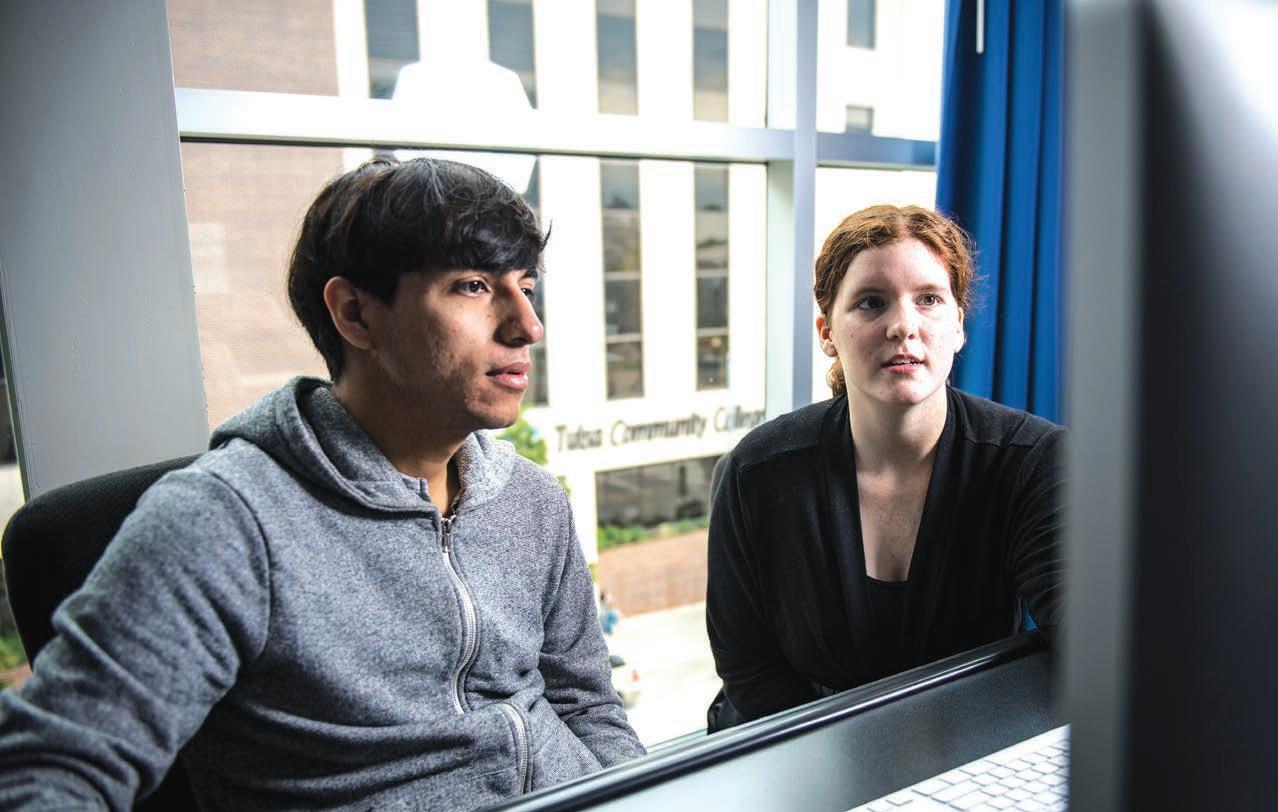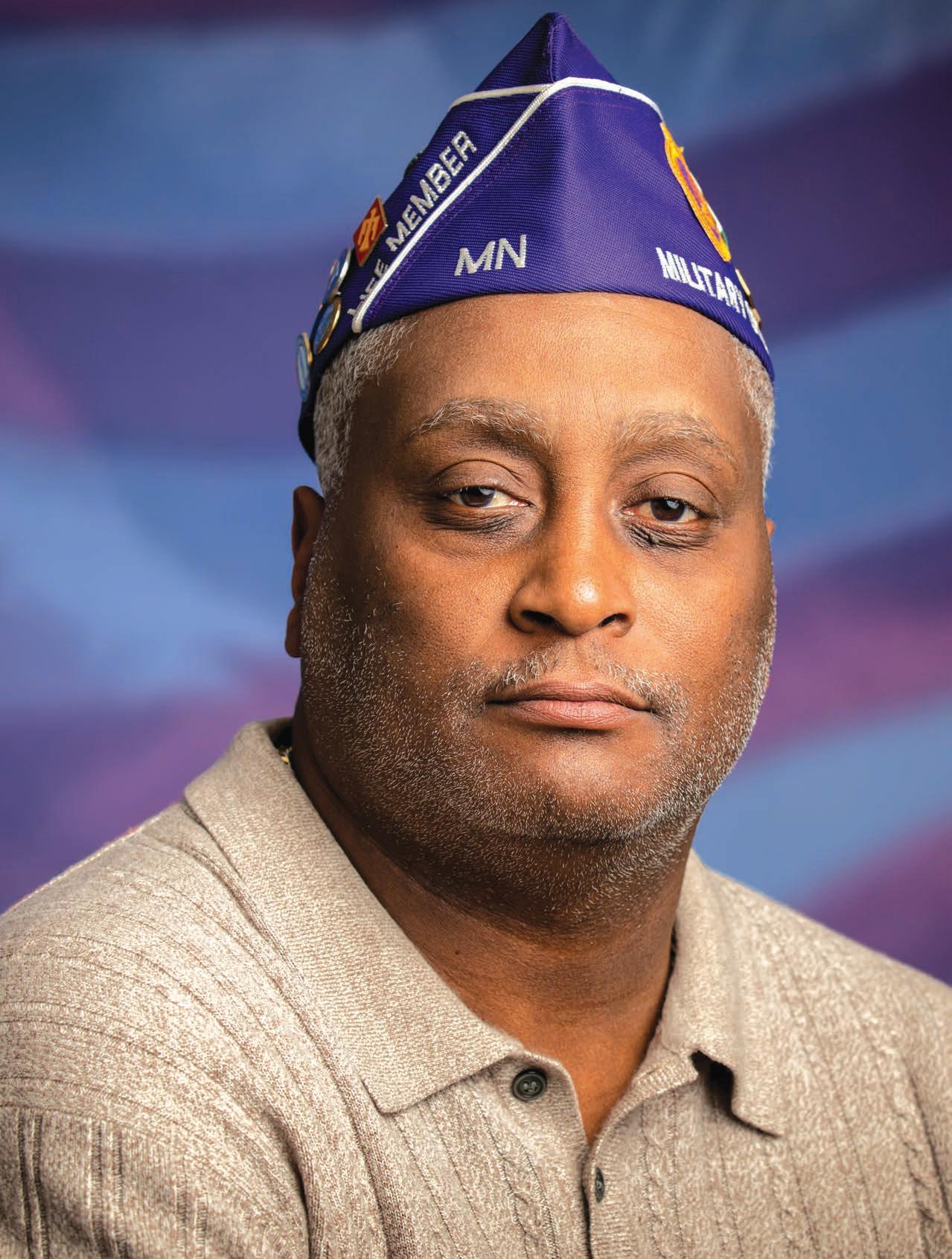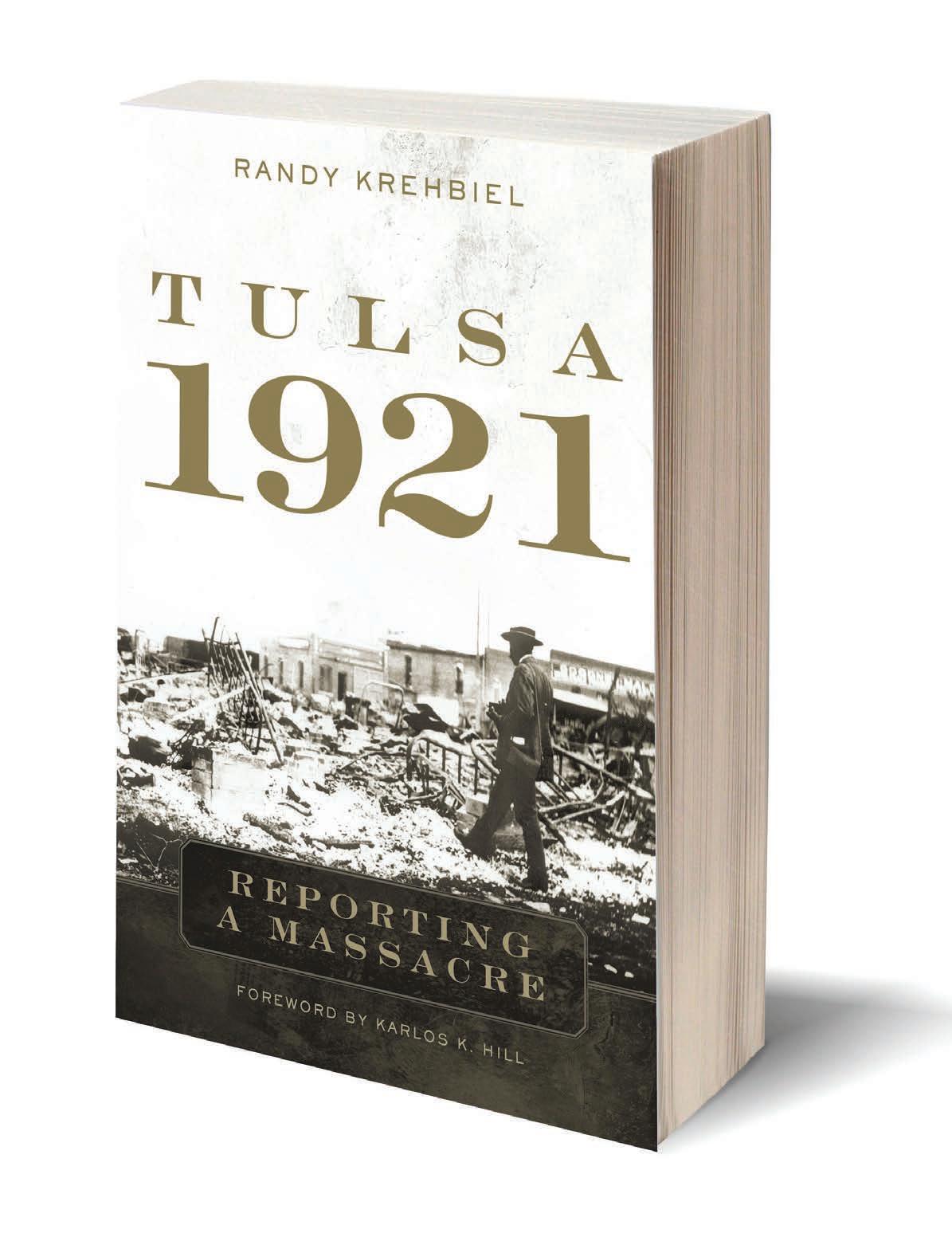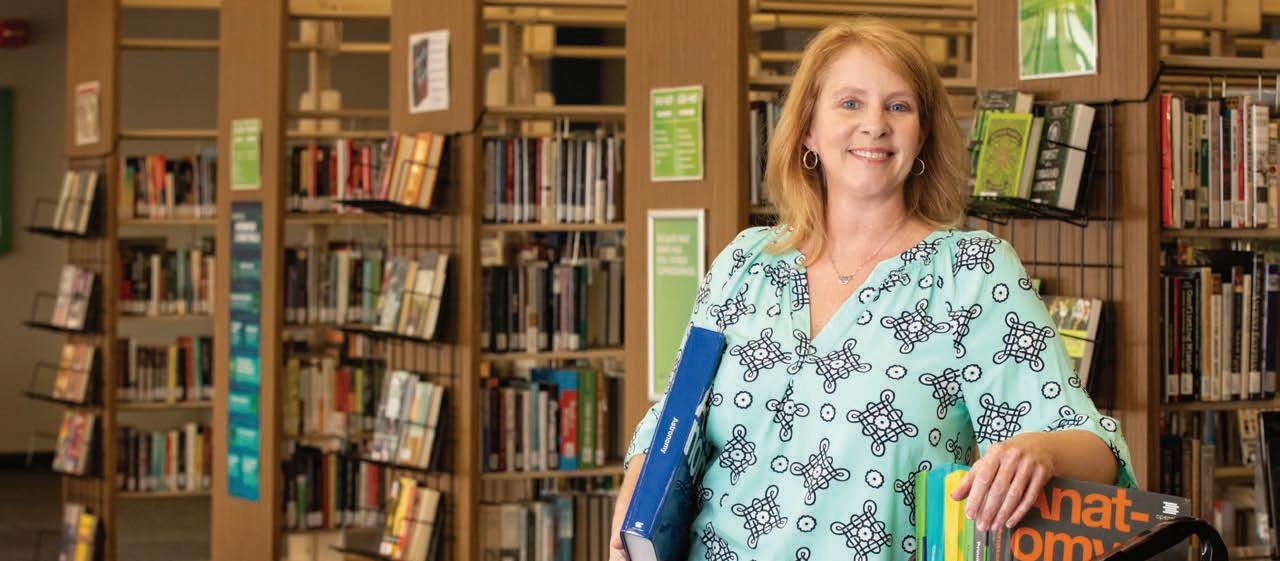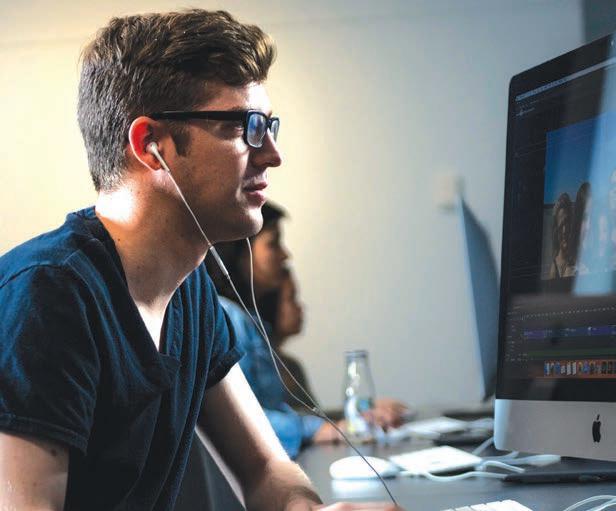
19 minute read
tulsacc.edu/communitymagazine
Community Magazine is a publication of Tulsa Community College
Tulsa Community College 6111 E. Skelly Drive, Suite 400 Tulsa, OK 74135
Advertisement
Leigh B. Goodson, PhD. President & CEO
TCC Board of Regents: Robin F. Ballenger, Chairman Samuel Combs III, Vice-Chairman Paul H. Cornell, Secretary Caron Lawhorn, Member Ronald S. Looney, Member William R. McKamey, Member Wesley G. Mitchell, Member
Community Magazine is published each Fall and Spring semester
CONTENTS SPRING 2020
16
Transfer-mation: The Tulsa Transfer Project
04 50th Anniversary Exhibit
06 50 Notable Alumni
08 TCC Goes to Washington
10 Habla Español?
12 Fall 2019 Graduation
14
16 Five Things with Mackenzie Wilfong
Transfer-mation
20
22 On Mission: Open Educational Resources
Game Changer
25 50th Anniversary Gala
26
28
30 Common Book Tackles 1921 Tulsa Race Massacre
Providing Support For Those Who Served
Inspiring Hope: The TCC Student Emergency Fund

A Letter From TCC President Leigh B. Goodson
A lot in the world has changed since I started my letter for Community Magazine. Originally, I was planning to discuss changes to higher education delivery and university transfer. As we head to print for this magazine, TCC, and the world, have been impacted by the Coronavirus (COVID-19) pandemic. It has affected immediate change in our day-to-day reality and made us focus on our responsibilities to the community, our students and our staff.
In just a matter of days, we fully transitioned all TCC classes and support services to online and remote learning. As you can imagine, that decision was one of the hardest I’ve ever had to make. Transitioning away from face-to-face classes will cause additional stressors for some faculty and students, but it’s the right thing to do to keep our students and employees safe. In many aspects, it was the only decision to be made. Simple, but not easy.
I am so proud of the response by our employees to this new normal. Faculty who have never taught a day of online classes before have jumped head-first into the world of virtual learning. Our Distance and Engaged Learning teams have risen to the occasion and provided real-time support and training for faculty. Our Information Technology team has truly been a bright gold star for the College, keeping all our systems working with increased online demands and developing new ways to transition TCC to this virtual world we find ourselves in.
I could go on and on about the stories of hope and perseverance our employees show, but trust me, it’s an honor to work with such great people all dedicated to providing the same high-caliber of learning experience for our students, both in the classroom and online.
We have created a special webpage for students and employees with communication and resources related to this transition. If you’re curious, visit TulsaCC.edu/Coronavirus for all the latest updates.
In this time of extreme social and economic uncertainty, I’m humbled by the continued generosity of our donors. We started a student emergency fund giving campaign and its wonderful seeing our TCC community support our students during this time of need.
We don’t know when the pandemic will end, but I promise you TCC will be here to continue delivering the same excellent level of learning. As with any adversity, we will come out stronger and even more equipped to serve our students. Education doesn’t end just because we have a pandemic, and the impact it will have on our community will last for years. We all have a responsibility, one we take most seriously, to do our parts to ensure students continue to learn and graduate even as we are a virtual campus.. We are strong individually, but together we are unstoppable.
Sincerely,
Leigh
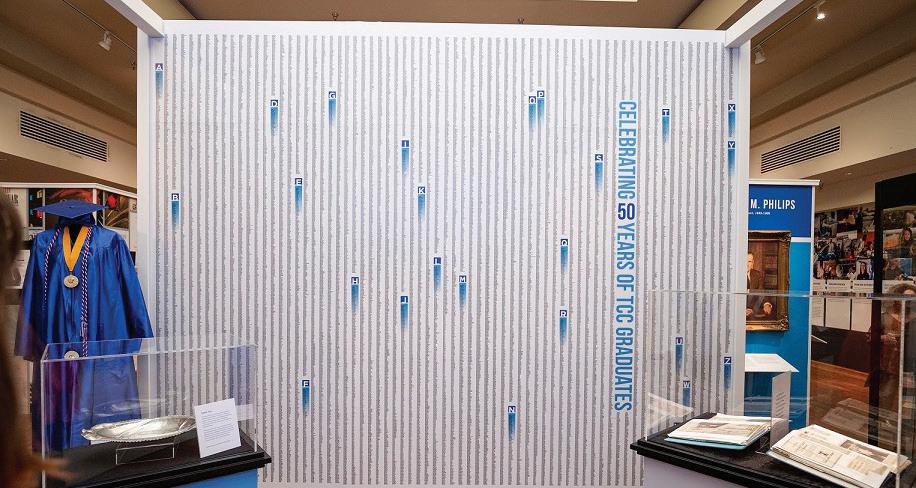
Good news … if you haven’t visited the TCC 50th Anniversary exhibit at the Tulsa Historical Society & Museum, you are in luck! The exhibit has been extended through August 2020. Located at 2445 S. Peoria, THS&M hours are Tuesday through Saturday: 10AM – 4PM; Closed Sundays, Mondays and holidays. Children and students are free. Adults are $5 and seniors are $3.

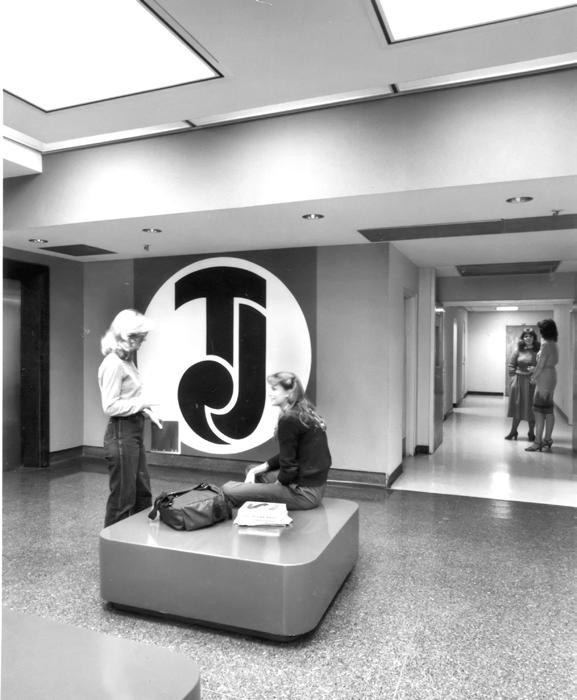
About the Cover
TJC Metro Campus lobby, circa late 1980s
The Sinclair Oil Building has been home to Tulsa Community College since day one – Sept. 14, 1970 – when we opened as Tulsa Junior College to a first class of 2,796 students.
The entire College consisted of three floors of leased space and 50 classrooms, 48 full-time and 106 part-time instructors and 15-hour class days, and it grew from there.
Now Oklahoma’s largest multi-campus community college, TCC serves approximately 23,000 students in college programs annually. Four fully equipped campuses — Metro, Northeast, Southeast and West — populate the Tulsa area, along with several community campuses in the suburban areas.
50 NOTABLE ALUMNI
In celebration of 50 years of Tulsa Community College, we’re highlighting 50 distinguished and noteworthy alumni, one a week. You can visit TCC50.com to explore TCC’s historical timeline, the full list of 50 Notables unveiled to date, and experience how TCC has spent 50 years making our community stronger.
Paula Marshall, Ph.D.
CEO, Bama Companies TCC Degree: Business Graduated: 1986
As Bama’s Board Chair and CEO, Paula Marshall helps provide strategic leadership and direction to the entire organization. Her vision stands as a beacon for Bama team members, inspiring the organization to achieve the Bama mission – “People Helping People Be Successful...with caring and accountability.”
Marshall joined the Bama Companies during her high school years and assumed responsibility as Chair & CEO in 1990, which now includes Bama Pie, Bama Foods, Bama Frozen Dough, 25% owner of Bama China and Bama Europa. In 2018, Bama acquired a 25% interest in a UK company named Evron Foods. They provide bread for Subway in the UK.

Under her leadership Bama has expanded to provide a wide variety of hand-held specialty baked goods to fast food chains around the world.
Over the years, Marshall went on to earn bachelor’s, master’s and doctorate degrees. An author of four books, she most recently co-authored The
Executive Entrepreneur with New York Times bestselling author Jim Stovall.
The First Half
Paula Marshall, Ph.D. John Bobb-Semple Tammi Holden, M.A.A.L. Dallas Elleman Anna America Ernie Jones, M.Ed. Pamela Ballard, M.H.R. Emeka Nnaka, M.H.R. Tim Jackson
Emeka Nnaka, M.H.R.
Motivational Speaker TCC Degree: Enterprise Development Graduated: 2015 Emeka Nnaka is very involved in the community, speaks to corporate and civic groups, and advocates for others through his work with the Tulsa Area United Way and The Center for Individuals with Physical Challenges. Named one of Tulsa World’s People to Watch for 2019, he has continued to speak to groups across the country as a motivational speaker. Nnaka earned an associate degree in Enterprise Development from Tulsa Community College in 2015. “TCC was the steppingstone that I needed to launch to my future,” he said. After graduating from TCC, Nnaka went on to earn a bachelor’s degree in Rehabilitation Services and a master’s in Human Relations with a focus of Clinical Mental Health Counseling. His work with young people as a mentor at Youth Services of Tulsa, as a counselor at various Tulsa-area schools and his motivational speaking engagements share the same message of determination and hope. He suffered a neck and spinal cord injury in 2009 that left him paralyzed from his chest down and he now uses a wheelchair. Telling his story, he uses his own life-altering experiences to motivate young people to make a new start – to find strength through adversity. He uses the R-E words: rebuild, rewrite, renovate, renew and regenerate. Earlier this year, Nnaka served as the keynote speaker at the third annual Tulsa World All-World Awards ceremony, which honors the best area high school athletes. He also currently serves as a board member for the Metropolitan Tulsa Transit Authority. Lisa Riley Michael Willis, M.P.A. Linda Siegmann, M.B.A. Tim Lyons Tiffani Bruton Sharon Bishop-Baldwin Jeremy Moore, M.P.A. Debbi Guilfoyle, Ed.D. Byron Bighorse Dani Moore Joseph K. Digges, D.D.S. Glenna Cooper, M.A. James E. Jones, Pharm.D. Rose Lynch Tim Bart, M.Ed.

Jackie Kouri
TCC GOES TO WASHINGTON
Three TCC faculty members – Dr. Sandra Rana, Dr. Knox Brown, and Professor Sydnee Moyers Pockrus – attended the Senate impeachment trial on Jan. 29, courtesy of Oklahoma Senator James Lankford.
All three are full-time political science professors.
At the request of Senator Lankford’s office, TCC submitted the names and contact information for the three professors, assuming one would be invited. All three received invitations, and only one Gallery ticket was available, so the faculty members took turns observing the proceedings.
The professors traveled on Jan. 28, witnessed the impeachment trial on the Jan. 29, and returned to Tulsa on Jan. 30.
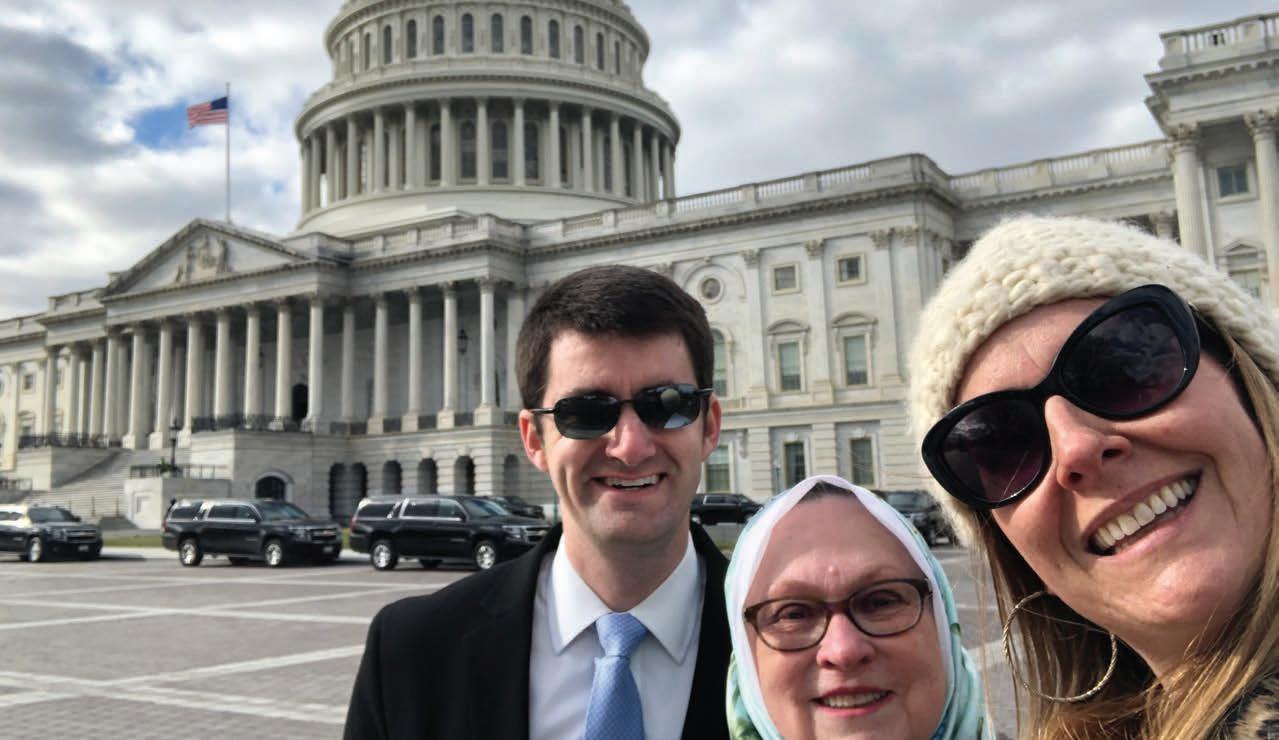
“It was very exciting. I cannot thank the College enough for allowing us to go,” says Dr. Rana. “It was a commitment to allow us to do that, to have the time and to pay for the experience. It was a wonderful advancement of our professional education, and now we’re able to utilize that in our classrooms.”
“I always tell my students that a week in a real political environment is worth a semester’s worth of political science,” says Dr. Brown. “Checks and balances are a fundamental part of our government, and my colleagues and I got to witness it up close and personal.
“My first impression when I arrived inside the Senate Gallery: seeing Chief Justice John Roberts up close. I teach the Supreme Court every semester, but to see the Chief Justice in person was awe inspiring. I also saw many current and former presidential candidates: Bernie Sanders, Elizabeth Warren, Mitt Romney, Cory Booker, and Kamala Harris.”
In addition to the historical weight of the event, Dr. Brown viewed the proceedings through the lens of a political analyst.
“Impeachment is 80 percent theater, 20 percent
politics, and 100 percent partisan,” says Dr. Brown. “At every turn, both parties acted self-servingly: witness selection, cross-examination rules, and the final votes in each chamber.”
Dr. Rana says the trip reconfirmed her belief in the American political system.
“I always tell my students that I have this bias, that I believe that individuals may come and go, but the American political system is robust and truly does work, and is a government of the people,” says Dr. Rana. “I spent part of my time going to the House of Representatives and visited the offices of quite a few representatives. The energy is still there. That dedication to service and government is still there.
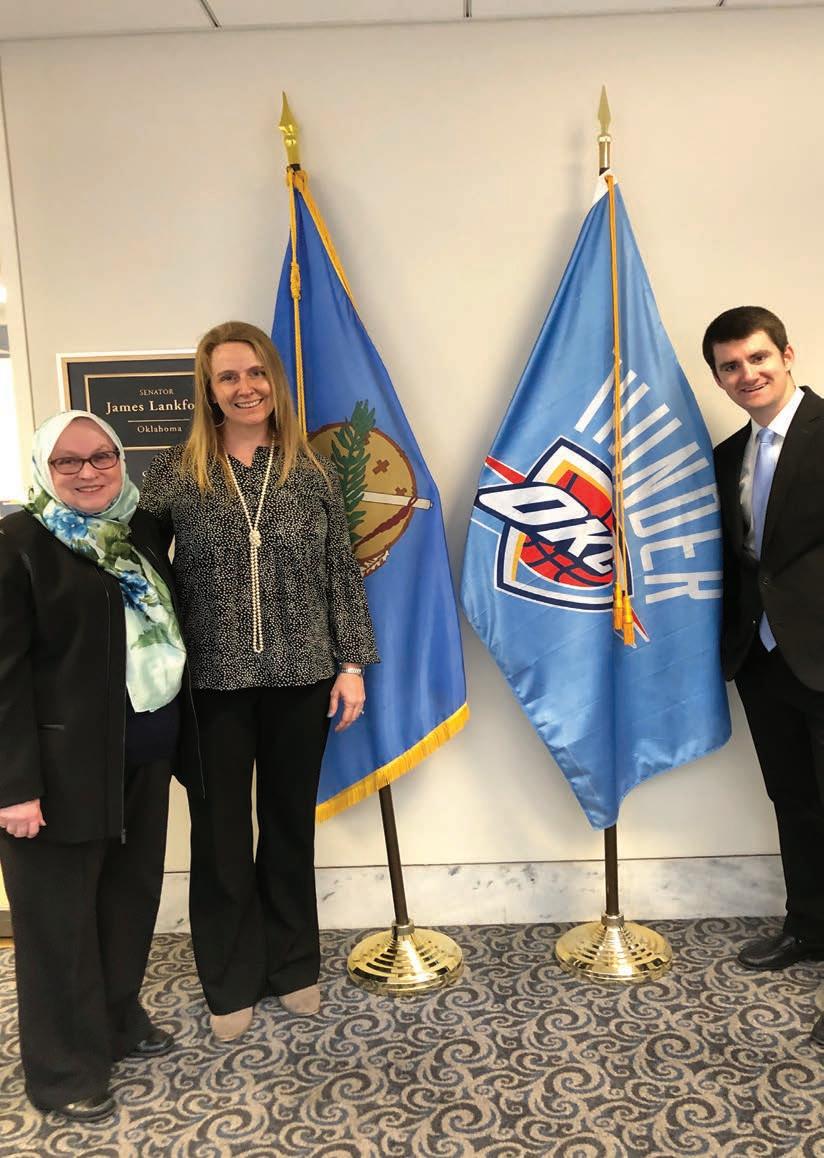
“That, to me, is real government. That someone can walk in and communicate directly with their elected official. Government is accessible. You have the ability to go there, to ask questions, to make suggestions. American Government is not just a general education class. It’s not just getting your three hours and going on with your program. This could potentially be a part of your everyday life. Asking questions. Talking to your elected officials.”
It was a once-in-a-lifetime experience for TCC’s faculty members.
“This was an amazing opportunity for our faculty members to witness a piece of history in the making,” says Dr. Tracy Skopek, dean of liberal arts and communication. “To be able to come back and share this with their students makes it real instead of coming from a textbook or through the lens of the media. It doesn’t matter what your partisan preference is, it’s something most of our students will not have experienced.”
HABLA ESPAÑOL?
TCC Intermediate Spanish 2, Fall Semester, 2019 Metro Campus Instructor, Tony Alonso
What do a former Oklahoma State Supreme Court Justice, a medical doctor, a police officer, a nurse, an engineer, and, most importantly, a number of degree-seeking students have in common?


They trust TCC to deliver expert instruction in foreign language.
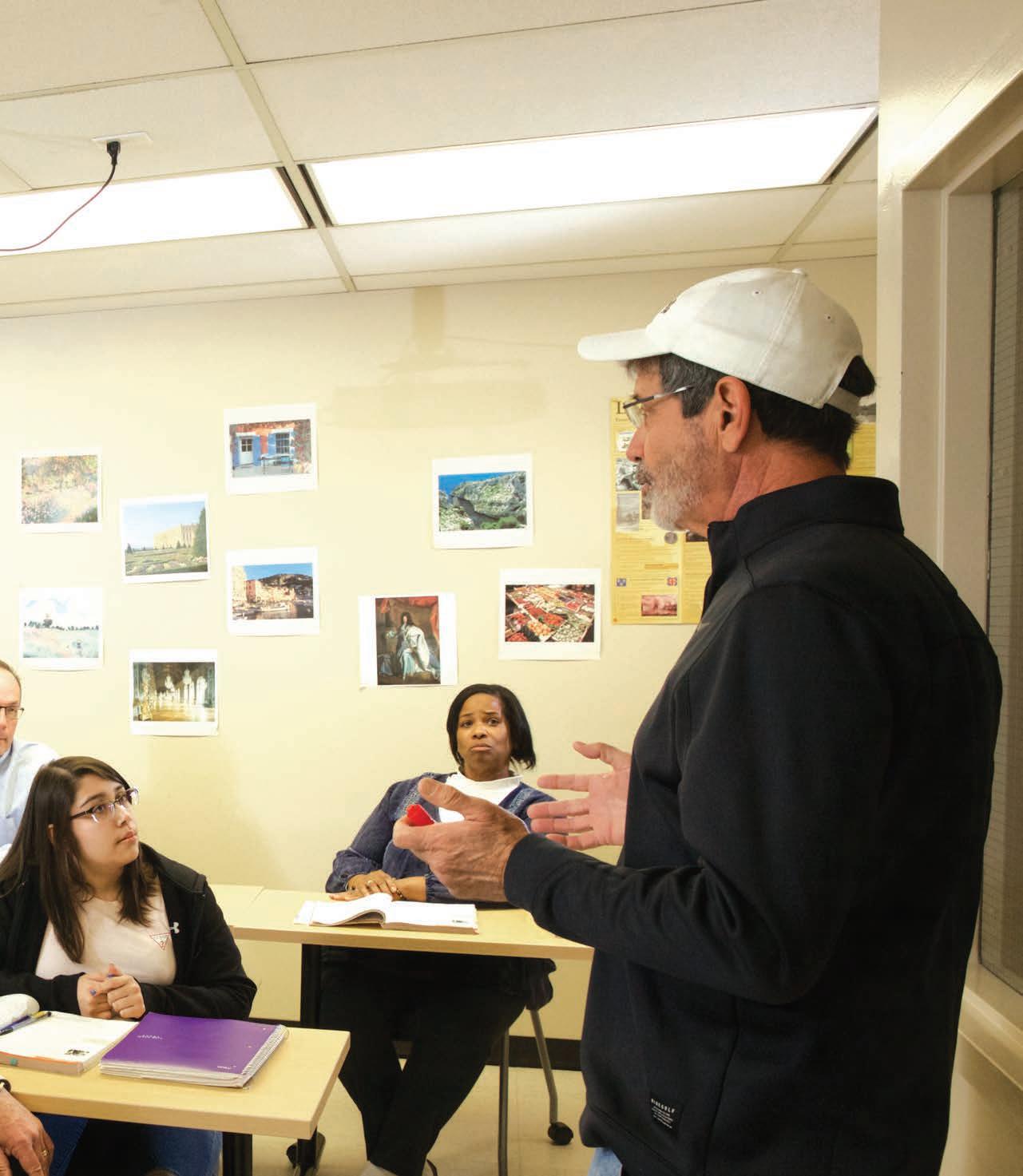
Fall 2019 GRADUATION
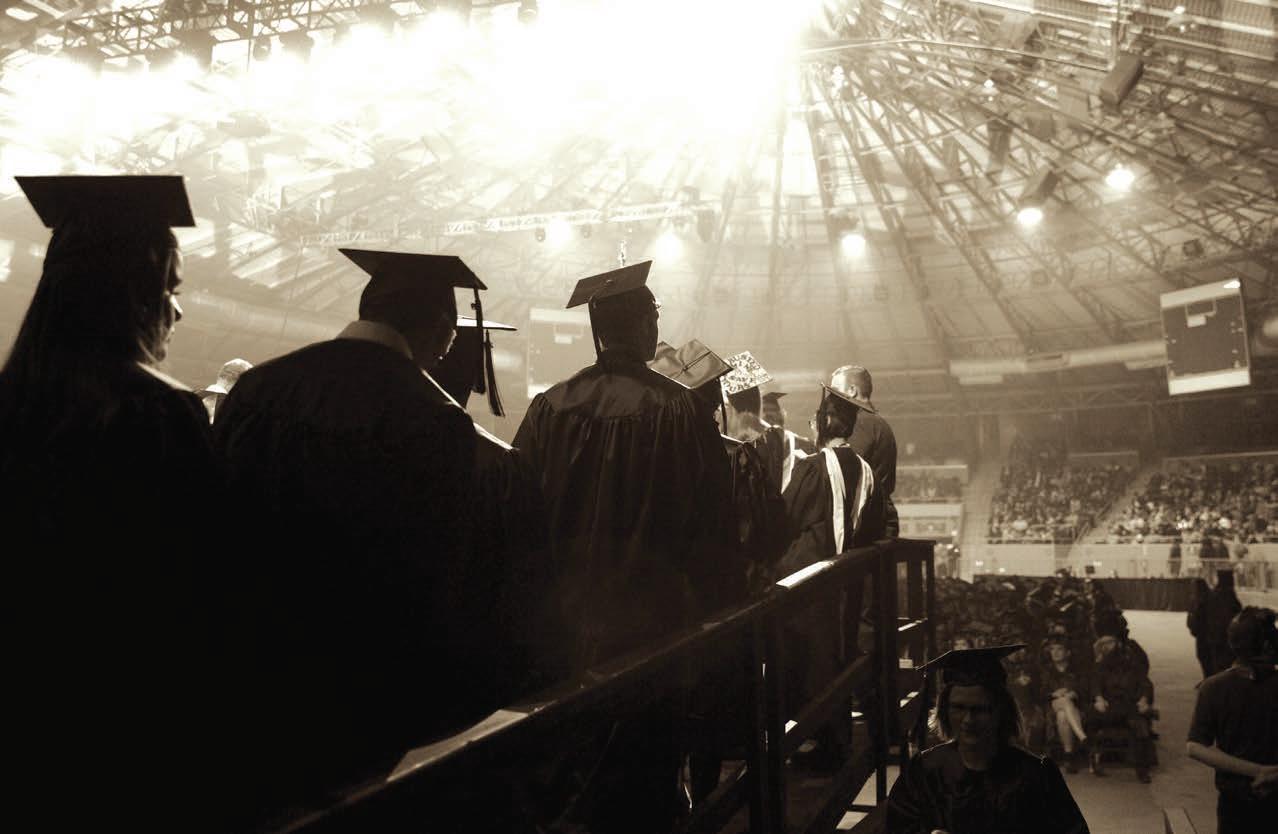
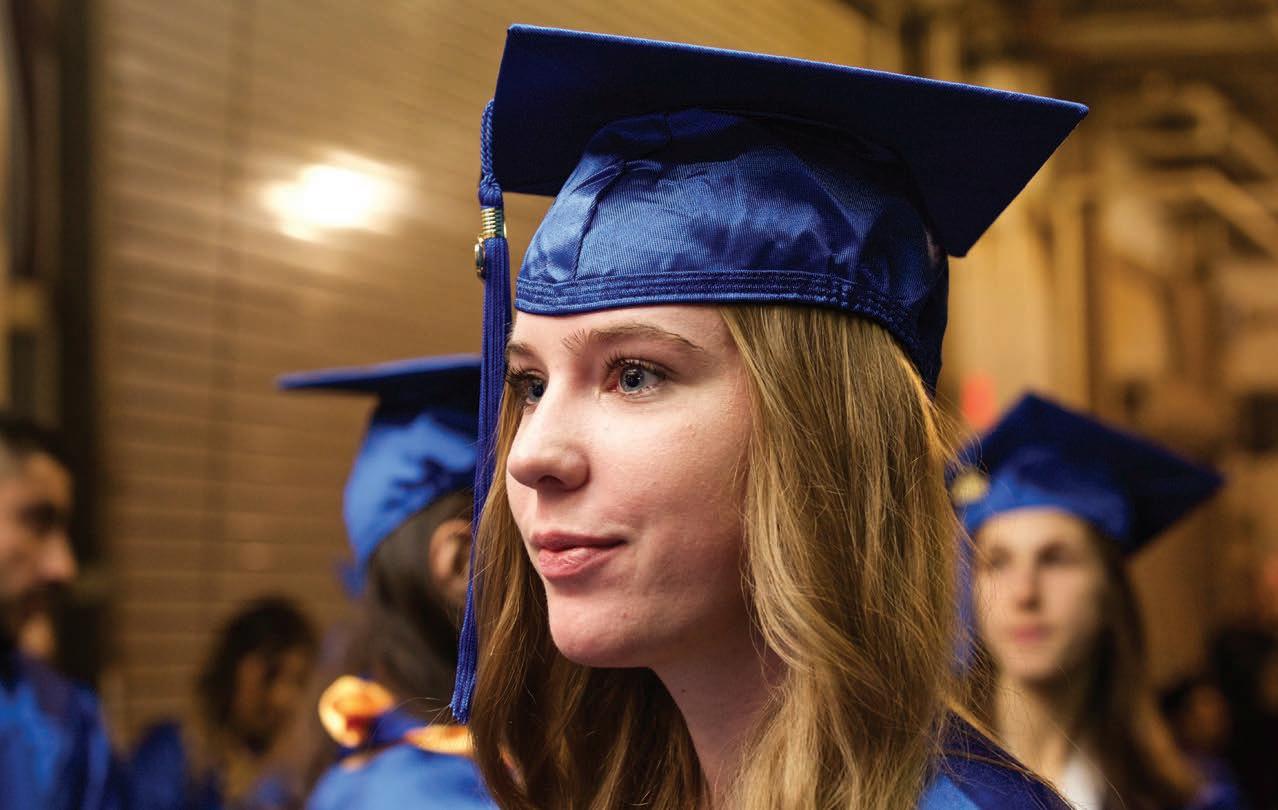

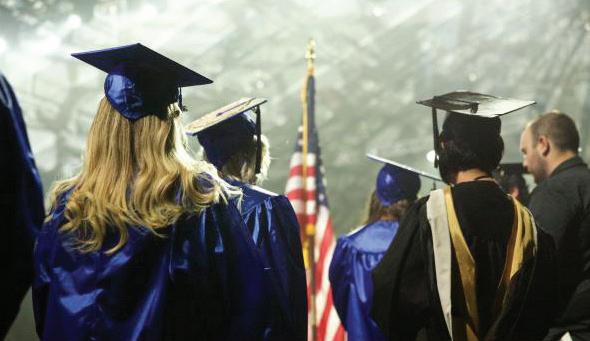
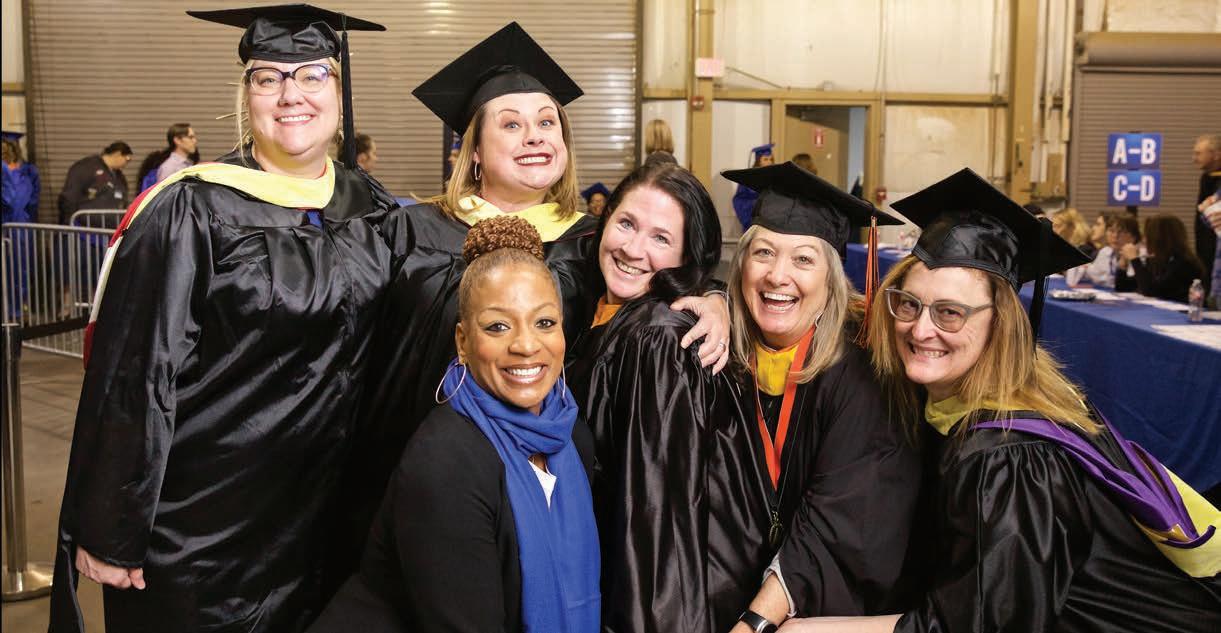
FIVE THINGS with MACKENZIE WILFONG
As TCC’s General Counsel, Mackenzie Wilfong ensures the College stays on the right side of any legal issues it should encounter. She believes in the power of the Law to provide justice and enable positive social change.
Here are her five favorite quotes from female U.S. Supreme Court Justices:
1. “Real change, enduring change, happens one step at a time.” – Justice Ruth Bader Ginsburg
This reminds me to have patience, change is incremental, sometimes painful, hopefully concluding by consensus where all voices are heard.
2. “We don’t accomplish anything in this world alone ... and whatever happens is the result of the whole tapestry of one’s life and all the weavings of individual threads form one to another that creates something.” – Justice Sandra Day O’Connor
I knit and crochet, so the illusion to weaving a tapestry resonates with me and reminds me we cannot do it alone. I am infinitely grateful to my legal network, a talented tapestry, of super-star female attorneys.
3. “Until we get equality in education, we won’t have an equal society.” – Justice Sonia Sotomayor This encourages me to recognize inequity and seek to fix it. I am so fortunate to get to work every day for a client, the College, whose mission is just this “Building success through education.”
4. “No one has a monopoly on truth or wisdom. I’ve learned that we make progress by listening to each other, across every apparent political or ideological divide.” – Justice Elena Kagan
This reminds me to listen (and hear) thoughtfully, purposefully, and carefully.
5. I’ll leave my favorite fifth quote to the fifth future female Justice with the hope she reads these, finds them inspiring, keeps working hard, is equitably rewarded and recognized for her legal acumen, and stands on the shoulders of these great Justices, these wise women, to whom we can all aspire to emulate.
As TCC’s General Counsel, Wilfong serves on the Executive Team and provides legal counsel to the College’s four campuses. She is a Board member of the Oklahoma Center for Community and Justice, and co-authored a chapter on the First Amendment in Higher Education for the recently published book Student Conduct Practice: The Complete Guide for Student Affairs Professionals. She received her Juris Doctorate degree from Southern Methodist University’s Dedman School of Law.
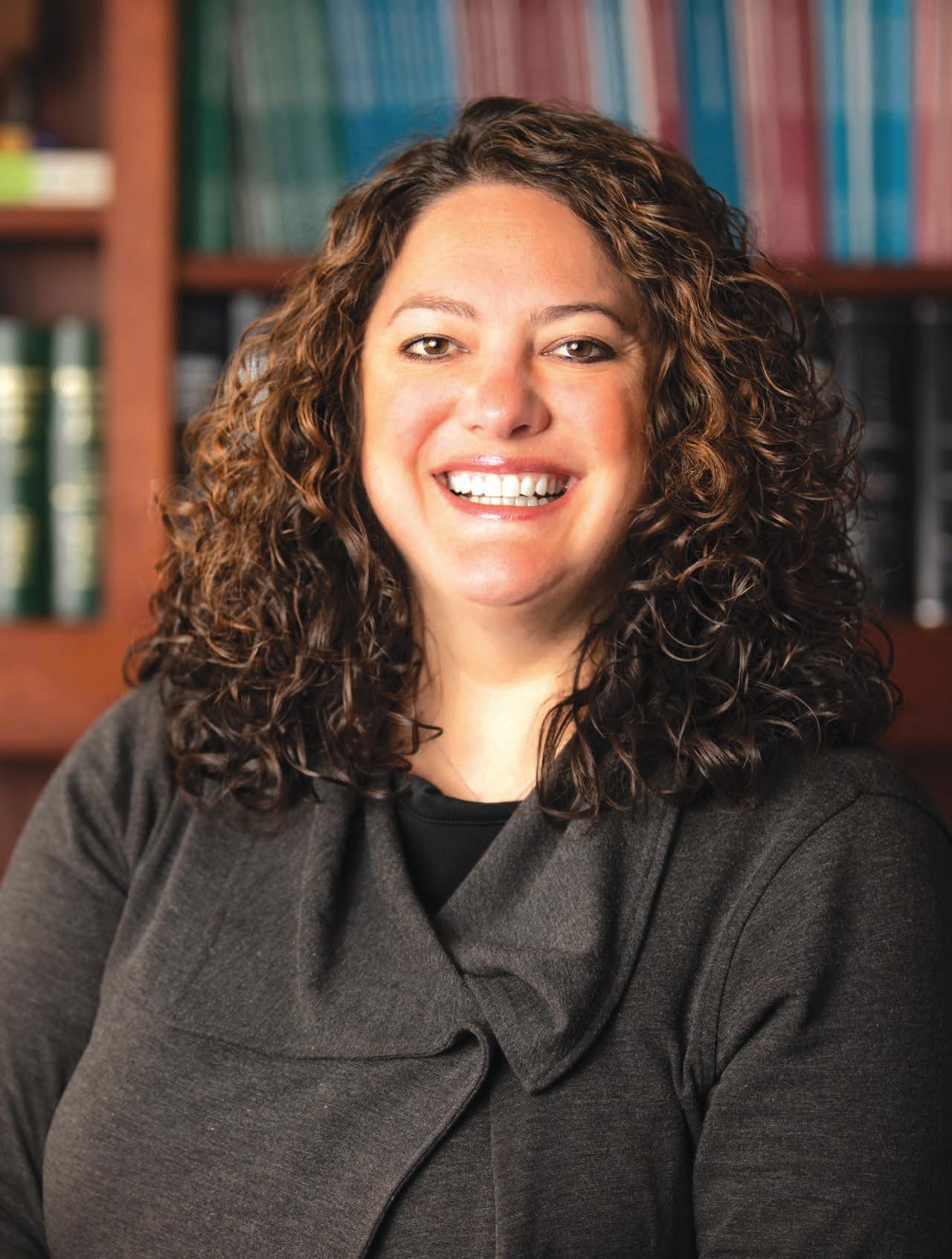
TRANSFER-MATION
TCC leading the charge to make transferring between highereducation institutions easier
Transferring from one higher education institution to another seems like one of those things that should be easy. Course credits taken at a community college should move seamlessly to a partner university, and a student should not lose any time, money, or momentum in pursuit of their bachelor’s degree.
It seems easy … but for many students, university transfer can be complex and frustrating
“We know transfer students encounter stumbling blocks,” says Emily Tichenor, TCC director of university transfer. “Regional universities have varied requirements for programs, which means students have to know exactly what they want to do and where they want to go after TCC from almost the initial semester. Sometimes credits are accepted, but as electives, meaning the student still enters their university as a sophomore, not a junior, after completing two years at TCC.”
TCC reached out to former students and asked them about their transfer experience.
“I was surprised the colleges do not talk. I could not ask an advisor at one school to tell me how to go through the whole process,” says one student. “I had to run back and forth trying to gather the information either I or the other school needed.” The back-and-forth theme popped up a lot.
Another student says, “Make sure all credits taken are credits that will transfer to the other institution so you aren’t taking unnecessary courses. Talk with both schools’ advisors.
“Meet with an advisor from both colleges, and ask what they recommend you do, and get e-mail addresses from both for the many follow-ups you’ll have. Then find a mentor who has also gone through the transfer process personally.”
The comments amount to a familiar word: barriers. TCC has spent the last several years removing barriers to student success. The College has been systematically making it easier for students to graduate, but the time has come to widen the scope. Students don’t just need any degree; they need bachelor’s degrees.
“TCC is not our students’ final learning experience,” says Cindy Hess, TCC senior vice president and chief academic officer. “We’ll have students selecting, not what their goal is here, but what their goal is in life. We have to look at expectations of the university

TCC

UNIVERSITY
Aiming for your bachelor’s degree?
Stay on-time, on-budget, and on-track with TCC2UNIVERSITY.
they’re transferring to. We have to be more aggressive looking at what our regional needs are.”
The Tulsa Transfer Project
According to the U.S. Government Accountability Office, nationally, transfer students lose an average of 13 credit hours from a community college to a fouryear university. By saving students time and money, producing more individuals with a bachelor’s degree, and having them stay in the region, this work is important to the economic growth of the state.
Our city, state, and geographic region falls slightly below the national average in number of bachelor’s degrees. The Tulsa Transfer Project was created in the spring of 2018 to address this deficiency and to increase the talent pipeline in the region.
Participating institutions include TCC, Langston University, Northeastern State University, Oklahoma State University-Tulsa, Rogers State University, The
TulsaCC.edu/Transfer
University of Tulsa, and University of Oklahoma-Tulsa.
The project was funded by the Charles and Lynn Schusterman Family Foundation and supported through work with the John N. Gardner Institute for Excellence in Undergraduate Education.
The three goals of the Tulsa Transfer Project are to increase the transfer rate of TCC students to four-year institutions, increase the percentage of transfer credits accepted toward majors at those four-year institutions, and increase rates of bachelor’s completion.
“We know an individual’s earning potential significantly increases with a bachelor’s degree — by nearly $20,000 annually compared to those with just a high school diploma, according to Census data on median earnings in Tulsa County. In supporting this collaborative work, we are increasing the likelihood that TCC students will have clear transfer pathways to the regional universities participating in this project, which will lead to higher rates of bachelor’s degree completion, a stronger workforce, and regional
economic growth,” says Michael DuPont, Charles and Lynn Schusterman Family Foundation Program Officer.

During fall of 2019, the partner institutions released the Tulsa Regional College Transfer Report, which summarized the findings and accomplishments of each partner institution, and outlined priorities for each as they seek to collectively improve the way they serve transfer students in the region.
“It forced us to really talk about our own policies and practices,” says Tichenor. “For TCC, it helped us realize where we needed to improve, where we weren’t communicating with students early enough. Students told us where their concerns were, which were chiefly financial. How much was it going to cost? Where would they live? They wanted that seamless transition not in just their course work, but for their lives.”
Now the real work begins – integrating the findings of the Transfer Project into workable transfer agreements and processes that benefit students.
“It’s working with our partners to advocate for students to make sure they have a unified educational experience,” says Tichenor. “Our partners are all committed to that. They want students to come from TCC and be successful, and they want them to do it on time and on track.
What’s Happening Now
Beginning in 2020, TCC will launch a new TCC2University program that aims to provide a clear, seamless, and supported pathway from TCC to a bachelor’s degree. A redesigned university transfer website will allow students to search bachelor’s degree options at partner schools and then connect to an associate degree at TCC to get them there.
“Making transfer pathways visible to our students early in their time at TCC is critical,” Tichenor says.
“Our students need to be able to see what is available and have early conversations with their advisors and faculty about how to achieve their goal.”
The Tulsa Transfer Project has also committed to building four-year degree maps from TCC to all area bachelor’s degrees. This work will ensure that if a student starts and stays on a degree map, their credits will be 100% accepted with the partner university.
“Students can come to TCC and get their first two years for free through Tulsa Achieves,” says Tichenor. “This is building on that promise. If your goal is a bachelor’s degree, start at TCC. We’re going to plan for the end with you, even if that end is not with us.”
“We’ve seen peer community colleges around the country who are doing a great job of this, and we know Tulsa can, too,” says Tichenor.
The Transfer project is also committed to shared student supports across institutions, and to data sharing to ensure students are successful. Institutions are also committed to students earning an associate degree before transferring. Students who transfer to a four-year institution after achieving an associate degree have a much higher success rate in achieving a bachelor’s degree. Where We Are Headed
All of these changes are necessary as TCC enters its second half-century of operation, and in line with the College’s new mission and vision – to build success through education through an educated, employed, and thriving community. With over 60 percent of TCC students enrolled in a university transfer degree program, the success of the Tulsa Transfer Project is critical for Tulsa.
“I’m excited about this,” says Dr. Leigh B. Goodson, TCC president and CEO. “We’re taking something that was clunky and awkward and building a higher education ecosystem. By associating with these universities, it breaks down these barriers.”
In the end, it comes back to student success.
“Everything we do is with the student’s desired outcome in mind,” says Tichenor. “TCC2University and supporting our students in earning a bachelor’s degree here in Tulsa will really change the economic trajectory for students and their families.”
